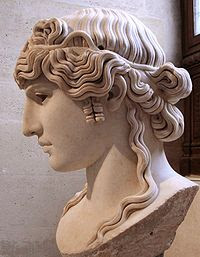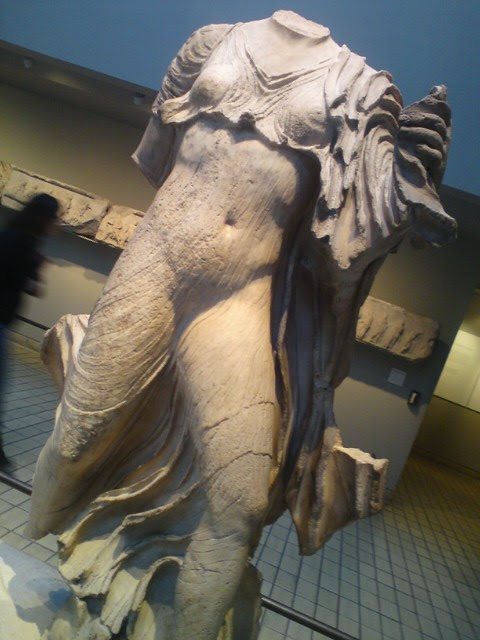I spent most of the night wearing a pair of donkey ears and drinking gin. Love!
Saturday, February 13, 2010
Friday, February 12, 2010
Socrates & Diotima on the nature and being of love.
Posted by
Unknown
at
7:35 PM
Labels:
diotima socrates love plato symposium wine greek greece classical
0
comments
From Plato's Symposium:
(Diotima)
And now, taking my leave of you, I would rehearse a tale of love which I heard from Diotima of Mantineia, a woman wise in this and in many other kinds of knowledge, who in the days of old, when the
"What then is Love?" I asked; "Is he mortal?" "No." "What then?" "As in the former instance, he is neither mortal nor immortal, but in a mean between the two." "What is he, Diotima?" "He is a great spirit (daimon), and like all spirits he is intermediate between the divine and the mortal." "And what," I said, "is his power?" "He interprets," she replied, "between gods and men, conveying and taking across to the gods the prayers and sacrifices of men, and to men the commands and replies of the gods; he is the mediator who spans the chasm which divides them, and therefore in him all is bound together, and through him the arts of the prophet and the priest, their sacrifices and mysteries and charms, and all, prophecy and incantation, find their way. For God mingles not with man; but through Love. all the intercourse, and converse of god with man, whether awake or asleep, is carried on. The wisdom which understands this is spiritual; all other wisdom, such as that of arts and handicrafts, is mean and vulgar. Now these spirits or intermediate powers are many and diverse, and one of them is Love. "And who," I said, "was his father, and who his mother?" "The tale," she said, "will take time; nevertheless I will tell you. On the birthday of Aphrodite there was a feast of the gods, at which the god Poros or Plenty, who is the son of Metis or Discretion, was one of the guests. When the feast was over, Penia or Poverty, as the manner is on such occasions, came about the doors to beg. Now Plenty who was the worse for nectar (there was no wine in those days), went into the garden of Zeus and fell into a heavy sleep, and Poverty considering her own straitened circumstances, plotted to have a child by him, and accordingly she lay down at his side and conceived love, who partly because he is naturally a lover of the beautiful, and because Aphrodite is herself beautiful, and also because he was born on her birthday, is her follower and attendant. And as his parentage is, so also are his fortunes. In the first place he is always poor, and anything but tender and fair, as the many imagine him; and he is rough and squalid, and has no shoes, nor a house to dwell in; on the bare earth exposed he lies under the open heaven, in-the streets, or at the doors of houses, taking his rest; and like his mother he is always in distress. Like his father too, whom he also partly resembles, he is always plotting against the fair and good; he is bold, enterprising, strong, a mighty hunter, always weaving some intrigue or other, keen in the pursuit of wisdom, fertile in resources; a philosopher at all times, terrible as an enchanter, sorcerer, sophist. He is by nature neither mortal nor immortal, but alive and flourishing at one moment when he is in plenty, and dead at another moment, and again alive by reason of his father's nature. But that which is always flowing in is always flowing out, and so he is never in want and never in wealth; and, further, he is in a mean between ignorance and knowledge. The truth of the matter is this: No god is a philosopher. or seeker after wisdom, for he is wise already; nor does any man who is wise seek after wisdom. Neither do the ignorant seek after Wisdom. For herein is the evil of ignorance, that he who is neither good nor wise is nevertheless satisfied with himself: he has no desire for that of which he feels no want." "But-who then, Diotima," I said, "are the lovers of wisdom, if they are neither the wise nor the foolish?" "A child may answer that question," she replied; "they are those who are in a mean between the two; Love is one of them. For wisdom is a most
I said, "O thou stranger woman, thou sayest well; but, assuming Love to be such as you say, what is the use of him to men?" "That, Socrates," she replied, "I will attempt to unfold: of his nature and birth I have already spoken; and you acknowledge that love is of the beautiful. But some one will say: Of the beautiful in what, Socrates and Diotima?-or rather let me put the question more dearly, and ask: When a man loves the beautiful, what does he desire?" I answered her "That the beautiful may be his." "Still," she said, "the answer suggests a further question: What is given by the possession of beauty?" "To what you have asked," I replied, "I have no answer ready." "Then," she said, "Let me put the word 'good' in the place of the beautiful, and repeat the question once more: If he who loves good, what is it then that he loves? "The possession of the good," I said. "And what does he gain who possesses the good?" "Happiness," I replied; "there is less difficulty in answering that question." "Yes," she said, "the happy are made happy by the acquisition of good things. Nor is there any need to ask why a man desires happiness; the answer is already final." "You are right." I said. "And is this wish and this desire common to all? and do all men always desire their own good, or only some men?-what say you?" "All men," I replied; "the desire is common to all." "Why, then," she rejoined, "are not all men, Socrates, said to love, but only some them? whereas you say that all men are always loving the same things." "I myself wonder," I said,-why this is." "There is nothing to wonder at," she replied; "the reason is that one part of love is separated off and receives the name of the whole, but the other parts have other names." "Give an illustration," I said. She answered me as follows: "There is poetry, which, as you know, is complex; and manifold. All creation or passage of non-being into being is poetry or making, and the processes of all art are creative; and the masters of arts are all poets or makers." "Very true." "Still," she said, "you know that they are not called poets, but have other names; only that portion of the art which is separated off from the rest, and is concerned with music and metre, is termed poetry, and they who possess poetry in this sense of the word are called poets." "Very true," I said. "And the same holds of love. For you may say generally that all desire of good and happiness is only the great and subtle power of love; but they who are drawn towards him by any other path, whether the path of money-making or gymnastics or philosophy, are not called lovers -the name of the whole is appropriated to those whose affection takes one form only-they alone are said to love, or to be lovers." "I dare say," I replied, "that you are right." "Yes," she added, "and you
hear people say that lovers are seeking for their other half; but I say that they are seeking neither for the half of themselves, nor for the whole, unless the half or the whole be also a good. And they will cut off their own hands and feet and cast them away, if they are evil; for they love not what is their own, unless perchance there be some one who calls what belongs to him the good, and what belongs to another the evil. For there is nothing which men love but the good. Is there anything?" "Certainly, I should say, that there is nothing."
"Then," she said, "the simple truth is, that men love the good." "Yes," I said. "To which must be added that they love the possession of the good? "Yes, that must be added." "And not only the possession, but the everlasting possession of the good?" "That must be added too." "Then love," she said, "may be described generally as the love of the everlasting possession of the good?" "That is most true."
Friday, February 5, 2010
Neriads
Went to the British Museum today before college. Thought this little sea nymph was 'a bit of alright' Pity she'd lost her head. Possibly the best place in London to spend your time when you have nothing better to do. Fire alarm went off when I was there. We all had to exit through the basement which was cool. It was like a scene from the Thomas Crown Affair. Tried to grab the Roseta Stone on the way but they were watching me too closely.
Wednesday, February 3, 2010
Subscribe to:
Comments (Atom)



